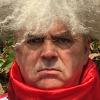Fresh Meat and Old Slabs: The Meat Puppets Rock On
Over the course of a career that has spanned more than three decades, the Meat Puppets have participated in some of pop music's most seminal moments. In the '80s, as part of the initial roster of the iconic indie label SST, the band was at the center of a movement that pushed underground music past its hardcore roots to expand it into a diverse, broad-reaching network of bands, venues and labels. The band was playing in 1991, when Nevermind hit No. 1 and punk principles collided with mainstream money. In 1993, Nirvana famously played "Plateau," "Lake of Fire" and "Oh, Me" from 1984's Meat Puppets II, on MTV’s "Unplugged" (the Puppets themselves served as backing musicians). Too High to Die, released on London Records the next year, went gold.
Now, we are reliving moments from this era. The flurry of press around Nevermind’s 20th anniversary is only just subsiding. Bands like Pavement and the Pixies have reunited for lucrative tours, and indie icons like Mission of Burma and Sonic Youth have headlined festivals with song-by-song performances of “classic” albums from their early careers. It makes sense that Meat Puppets would still be here as well. Since reforming in 2006, Curt Kirkwood and company have been steadily plying their trade, touring and making records. The latest, Rat Farm, arrives next month.
Rat Farm was mostly tracked live, a sign that the band's current lineup—guitarist Curt Kirkwood, his brother and bassist Cris Kirkwood and drummer Shandon Sahm—has grown more comfortable playing together. Rat Farm will sound familiar to fans of the band's earlier output, but the band has clearly matured. There's a level of studio polish here unknown during SST days, and Curt's voice in particular seems to have mellowed; gone is the caterwauling so prevalent on Meat Puppets II.
“It's always been hard for me to have a vision and to say, 'OK, this is what I want to get,'” says Curt Kirkwood. The band's process hasn't changed, but an accumulation of experience and a willingness to take more time in the studio have produced a different result. “Early on, we just used to kind of pull ourselves into the studio,” Kirkwood says. "[The band was] completely naïve… We'd get an engineer and go in and just do it.”
That naïveté may be part of what makes the early records indelible, but it's hard to reproduce. As Kirkwood explains, "The technology came along and it started to [sound] polished in any case." The band's scuzzy early recordings were a product of the time. Making a record nowadays, he says, “you can't even intentionally make it suck.”
Of course, that's not strictly true. Many bands do seek an intentionally rough sound. Whether it’s the four-track fuzz of Times New Viking, the Black Lips' garage-rock pastiche or even something as subtle as The Strokes' Julian Casablancas covering his microphone with his hand, each of these bands attempts to recreate a sound that originally resulted not from intention but from circumstance.
Ironically, while today's bands look to lo-fi recording techniques for inspiration, the Meat Puppets moved away from them in search of the same thing. The initial change in the Meat Puppets sound was bound up with the band's mid-'90s move to London Records. Signing to a major label meant more scrutiny, Kirkwood says. Still, it gave the band the opportunity to try a different approach to recording: “We wanted to have the experience of having more money and more time to mess around in the studio.”
Like their peers, Kirkwood and company have had occasion to look to the past. Twice, the band has performed as part of the “Don't Look Back” series at the All Tomorrow's Parties festival, where bands are asked to play seminal albums in their entirety—the Meat Puppets have performed both 1985's Up on the Sun and Meat Puppets II.
But Kirkwood expresses ambivalence about the experience. “Neither of them was my idea,” he says. “It's just a little strange. It turns out to be more of a stage production that way. It's more like a play.”
He’s more excited about the latest album. Rat Farm highlights Kirkwood’s guitar playing to a greater extent than earlier records. Where past albums featured virtuosic noodling, Rat Farm has straight-up solos. Some, like the one on “Leave Your Head Alone,” are worthy of Dinosaur Jr. (another '80s indie band enjoying a second lap). Neil Young has always seemed a lodestar for the Meat Puppets, and the influence is still apparent. The mellow country number “Sometimes Blue” sees the band shifting to a different register. If the wilder early records evoked Young's work with Crazy Horse, then the new record sees the band shading more towards CSNY.
And the band benefited from a good relationship with its new label, Megaforce Records, an indie. "I don’t want to hear everybody’s opinion,” Kirkwood says, “but they’re always encouraging me to go a little further; whereas, left to my own devices, I’ll revert right back to the ‘80s: Get it down, just do it, get it down, toss it out there."
Nowadays, the line between mainstream and indie has been blurred, and to some, it’s debatable whether that distinction is even relevant. New bands revive old sounds, while older bands make monuments of themselves. What it means to be in a band is no clearer now than it was to Kirkwood starting out. But the Meat Puppets frontman doesn’t let it bother him.
“I’m just a music fan; I like to play,” he says. “And then I’ve just gone along with these other plans.”
WHO: Meat Puppets, The Tomatoes, Hayride
WHERE: 40 Watt Club
WHEN: Saturday, March 30
HOW MUCH: $13
Keywords
More by Marshall Yarbrough
-

Destroyer's Dan Bejar Tackles the Myth of the Singer-Songwriter
Tuesday, Oct. 4 @ Caledonia Lounge
-

Quilt, Mutual Benefit, Juan de Fuca
Friday, Sept. 9 @ Caledonia Lounge
-

Why the Melvins Will Outlive Us All
Monday, Sept. 5 @ 40 Watt Club










comments